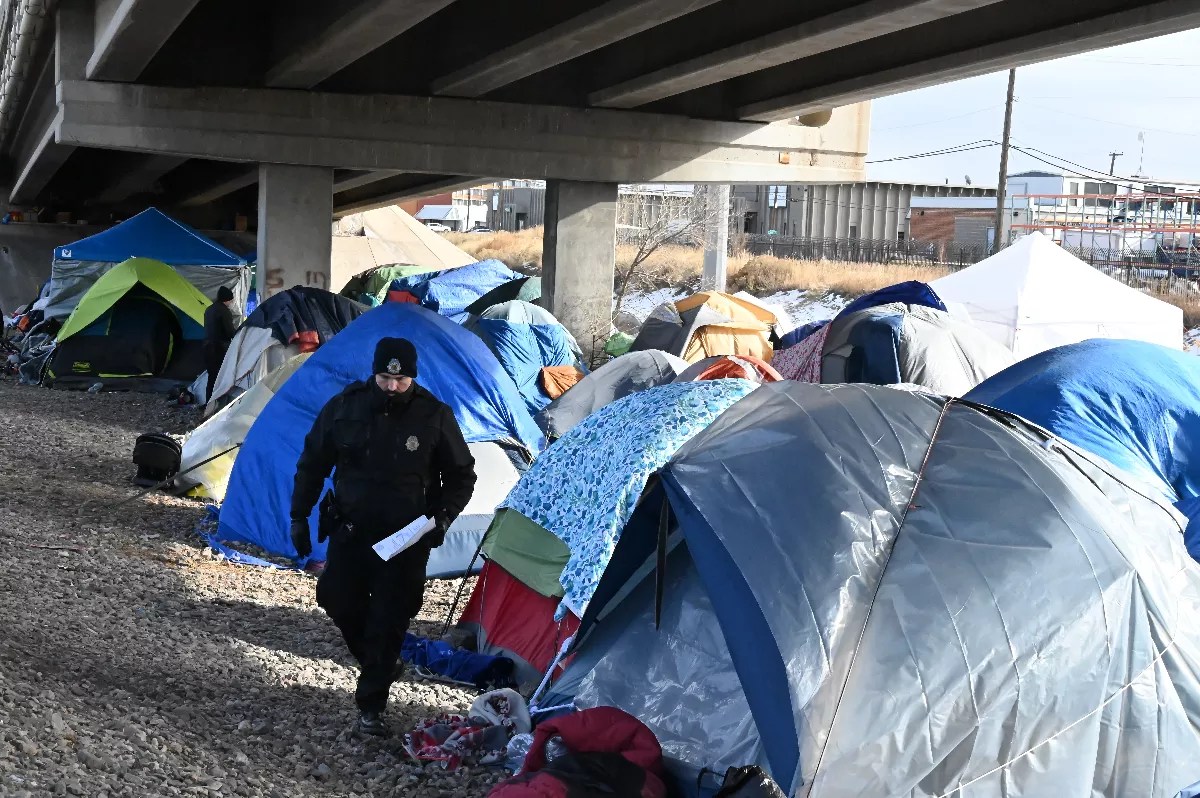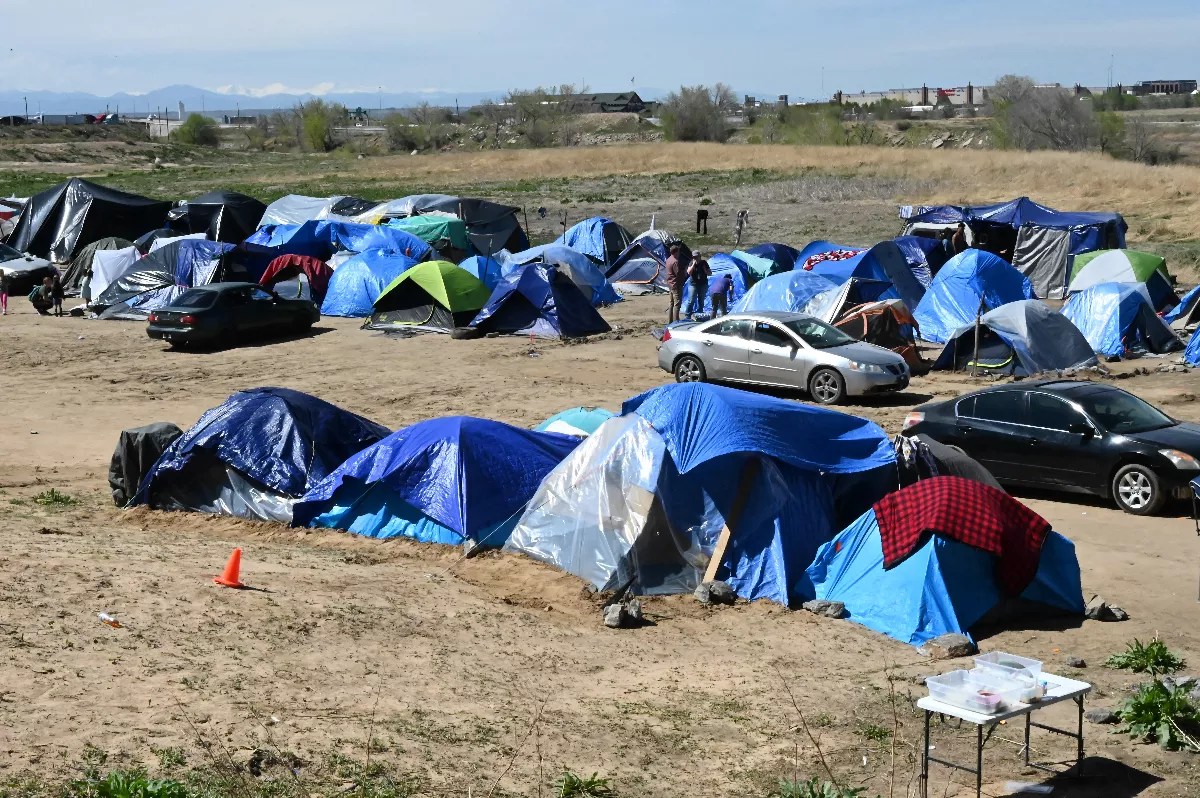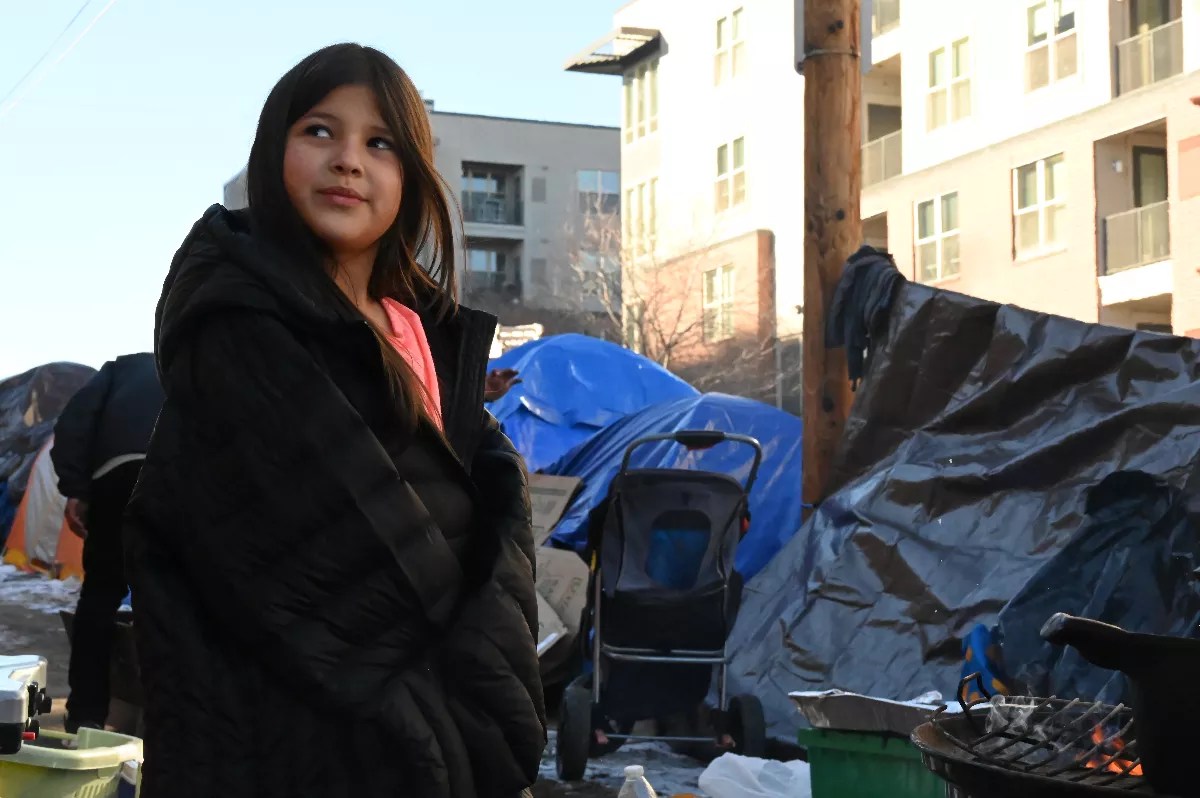
Bennito L. Kelty

Audio By Carbonatix
Finding an encampment of Venezuelan migrants in Denver wasn’t difficult in 2023 and early 2024, when there were tens of thousands of new arrivals. Just over a year later, the city is clear of migrant encampments – but threats from the feds regarding Denver’s immigration policies keep coming.
In early May 2023, dozens of migrants lived in a parking garage on the Auraria Campus while waiting for city services. In late 2023, hundreds of migrants slept in an encampment that nearly wrapped the block outside of the Quality Inn at 2601 Zuni Street, which was being used as a shelter for migrants. Months later, a migrant encampment popped up outside of Elitch Gardens. Through it all, the City of Denver steadily swept the camps and moved migrants into temporary housing services.
`
According to the city, there have been no new migrant encampments in Denver since last May, and most migrants have left official temporary housing, too. Where have they gone? The city doesn’t track that, according to Denver spokesperson Jon Ewing.
Now, with President Donald Trump’s administration cracking down on immigration and ramping up on deportation, more migrants are seeking asylum, not housing, and staying in touch with them is difficult.
A dozen migrants who shared their WhatsApp contact information with Westword over the last two years have disconnected from the app and are no longer reachable, including Luis Alvarado, a former cop jailed in Venezuela before fleeing to the United States, and Raul Mendoza, a Venezuelan migrant who apologized to Denver for taking up resources.

A migrant encampment outside Elitch Gardens grew from fifteen people to upwards of sixty last year.
Bennito L. Kelty
Although non-English speaking window washers can still be found on traffic islands and highway exits, there are far fewer than there were last year. And Venezuelan migrants haven’t hosted any large meetups, as they did after the Venezuelan election last July, when a gathering filled a shopping plaza in Aurora with upwards of 4,000 people.
More than 43,000 migrants, mostly from Venezuela, came to Denver starting in December 2022, when the city first declared an emergency over the wave of arrivals. Most of them had crossed the border by securing humanitarian parole, a designation that allows immigrants to enter temporarily for urgent reasons, and were then bussed to Denver, largely from El Paso.
Around half of the 43,000 arrivals took city-issued bus tickets to other places, according to the Denver mayor’s office. Many of those who stayed lived on the streets during their first few months here because they lacked permission to legally work in the United States. Others were on the street because they had timed out of hotels-turned-shelters that only allowed stays of four to six weeks.
But last summer, Denver closed its last hotel-turned-migrant shelter as new arrivals trailed off. During his appearance before a Republican-led congressional committee in March, Mayor Mike Johnston testified that there are no longer migrant encampments in Denver.
Denver’s Migrant Housing Pipeline
In April 2024, Denver published a “newcomer playbook” advising other large cities on how to handle an influx of migrants. It suggests that housing migrants was easier than housing the chronically homeless individuals whom the city has also been trying to help.
“This population is well-positioned to quickly self-resolve episodes of homelessness with the intervention of move-in assistance for market-rate housing,” the playbook notes. “Denver’s program success rate with this population far outpaces the rates of success we have previously seen using this intervention with chronically homeless and other unsheltered individuals.”
According to the playbook, the city spent more than $3,000 per family to move them into housing; from October 2023 to late January 2024, the city helped more than 170 families. In all, about 1,000 migrants received housing assistance from the city, including apartment deposits and first month’s rent, according to Ewing.
Housing migrants is cheaper for taxpayers than letting them live in encampments because “if recent arrivals exit shelter and move to tents in the streets, the city incurs costs for outreach services, enforcement, solid waste removal, and increased emergency room visits,” the playbook notes.
By February 2024, the city had already decreased the length-of-stay period for migrant shelters; in July, Denver closed its last hotel-turned-migrant shelter.
Even as it published the playbook, the city was turning its focus on the Denver Asylum Seeker Program, designed to help migrants apply for asylum, a designation that allows someone to stay in the country for fear of persecution back home. While qualified migrants applied for asylum, the city paid six months’ rent and trained them for jobs; after six months, they were expected to have a work permit, a job and an apartment.
Most of the migrants who came to Denver qualified for a quicker route to work permits than DASP because they had been paroled into the country using the CBP One app, which allowed immediate work permits for screened migrants under the Biden administration. The city assisted these migrants with their work permit applications; with housing assistance from local nonprofits, they were able to get into housing in a matter of weeks.
During a visit to Aurora last October, Trump called the CBP “Kamala’s app for illegals.” The administration shut down the app in early January.
Since the start of 2025, the city has shed most of the migrant services and programs created to handle the crisis. The first class of DASP participants finished their programming at the end of 2024, and the program as a whole wrapped up early this year, Ewing says; all told, only about 900 migrants went through DASP.
In December, the city ended its Newcomer Program, an agency formed in April 2024 to oversee the migrant response; its head, Sarah Plastino, no longer works for the city. An information dashboard that the city used to update the number of migrant arrivals each day is now defunct.
Migrants who received housing assistance from the city were not tracked after they moved out of temporary housing. Some of them were connected to case management services from nonprofits Papagayo and ViVe Wellness. A sizable portion of those migrants landed in Aurora – leading to the Venezuelan gang controversy of last summer.
The City of Aurora has threatened to sue Denver for not providing enough information regarding how Venezuelan migrants ended up in Aurora.

Upwards of ninety people were hiding at the migrant encampment in Central Park before the city shut it down in May 2024.
Bennito L. Kelty
Off the Grid
Some migrants preferred avoiding city programs, instead accepting assistance from Colorado churches and residents. Arthur Infante, a local artist and advocate for the homeless, helped build encampments for migrants, setting up bathrooms, drainage ditches and kitchen areas. People who lived in the encampments were largely from Venezuela, but also from Colombia and different parts of Africa, according to Infante.
The city dismantled his largest encampment last May, when around eighty to ninety people were living there. Not everyone went into a shelter right away – some of them erected a short-lived encampment in Green Valley Ranch – but they all ended up in a city-run shelter eventually, according to Ewing.
Infante hasn’t built an encampment for migrants since, and says he can’t find any around Denver. He believes the city successfully created a pipeline to move migrants from tents to stable housing, where many of them found jobs or more permanent living situations.
“For the most part, yes,” Infante agrees. “There were plenty of mistakes made along the way. This was the first time, and definitely a learning curve, but the people of Denver and the surrounding communities got it right.”
However, Infante also suggests that there are migrants “hiding” and “tucked away from the road” around Denver because of recent ICE raids.
Federal Immigration Enforcement Actions
Since taking office in January, Trump has followed through on threats to go after undocumented immigrants, as well as take action against jurisdictions with more welcoming policies.
Immigration and Customs Enforcement has recently led raids along the Front Range, with federal enforcement actions in Adams County, Aurora, Denver and Colorado Springs, where more than a hundred undocumented immigrants were arrested during a raid on an underground nightclub on April 27.
Trump issued an executive order that stopped the work of the Rocky Mountain Immigrant Advocates Network, a local legal aid nonprofit, including the hosting of informational sessions regarding detention centers and courts. (RMIAN’s work offering services for children has been reinstated.) Trump’s orders also stopped the resettlement of refugees in Colorado.
At the Denver City Council meeting on April 28, finance department staff revealed that the Trump administration had rescinded $24 million in grants in response to the city sheltering immigrants.
Since his first term, Trump has targeted Denver and Colorado as “sanctuary jurisdictions.” Denver was named a “sanctuary city” in a subpoena in 2017, and that designation resurfaced on May 2, when the Department of Justice sued Denver and Colorado to make their supposed sanctuary laws invalid. The City of Denver and the State of Colorado both have laws banning information like immigration status from being shared with ICE and federal law enforcement. Johnston has vowed to fight the suit; Governor Jared Polis has said he will comply with any laws.
On May 3, the Democrat-controlled Colorado House passed a law that further limits what kind of information the state can share with federal law enforcement and where ICE can go in public schools, hospitals and libraries without a judge-signed warrant. The state Senate passed the bill in April. Polis has not indicated whether he will sign the bill into law.
When Johnston stood up for Denver’s approach to immigrants last fall, he said that many in the city would stand up to the administration, including the Highland Moms.

Eight-year-old Aranza Delgado at the migrant encampment that used to be outside the Quality Inn at 2601 Zuni Street.
Bennito L. Kelty
Andrea Ryall led the Highland Moms, a community group that responded to the influx of migrants by helping them get donated food and clothes, start LLCs to secure jobs, and even form baseball teams and reunite people with dogs. She continues to help migrants apply for asylum at bimonthly workshops, and says the events still attract people who once lived in encampments.
According to Ryall, the demand for help with asylum applications has increased in recent months; she cites several success stories of people who went from living in encampments to getting jobs and finding housing.
“I have made some lifelong friendships that are rooted in those early days down at 26th and Zuni,” Ryall says. “I would do it again, and I haven’t stopped.”